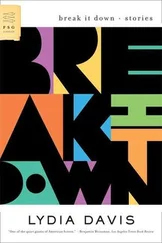Lydia Davis - Almost No Memory
Здесь есть возможность читать онлайн «Lydia Davis - Almost No Memory» весь текст электронной книги совершенно бесплатно (целиком полную версию без сокращений). В некоторых случаях можно слушать аудио, скачать через торрент в формате fb2 и присутствует краткое содержание. Год выпуска: 2001, Издательство: Farrar, Straus and Giroux, Жанр: Современная проза, на английском языке. Описание произведения, (предисловие) а так же отзывы посетителей доступны на портале библиотеки ЛибКат.
- Название:Almost No Memory
- Автор:
- Издательство:Farrar, Straus and Giroux
- Жанр:
- Год:2001
- ISBN:нет данных
- Рейтинг книги:3 / 5. Голосов: 1
-
Избранное:Добавить в избранное
- Отзывы:
-
Ваша оценка:
- 60
- 1
- 2
- 3
- 4
- 5
Almost No Memory: краткое содержание, описание и аннотация
Предлагаем к чтению аннотацию, описание, краткое содержание или предисловие (зависит от того, что написал сам автор книги «Almost No Memory»). Если вы не нашли необходимую информацию о книге — напишите в комментариях, мы постараемся отыскать её.
. In each of these stories, Davis reveals an empathic, sometimes shattering understanding of human relationships.
Almost No Memory — читать онлайн бесплатно полную книгу (весь текст) целиком
Ниже представлен текст книги, разбитый по страницам. Система сохранения места последней прочитанной страницы, позволяет с удобством читать онлайн бесплатно книгу «Almost No Memory», без необходимости каждый раз заново искать на чём Вы остановились. Поставьте закладку, и сможете в любой момент перейти на страницу, на которой закончили чтение.
Интервал:
Закладка:
I am still trying to understand just how Glenn Gould identified with the orderly woman and the passionate woman, just what sort of companionship he found with these two women and the other characters, if that’s what it was. He was something of a recluse, by choice. He arranged his life as he wanted it, scheduled his outside appointments as it suited him, watched television when he needed to, and was able to be selfish without hurting anyone. He was a generous and considerate friend, but he didn’t meet his friends in person very often because he believed that personal encounters were distracting and unnecessary. He said he could comprehend a person’s essence better over the phone. He had long conversations with his friends over the phone, always with a cup of tea in front of him. These conversations usually started at midnight, just before he went to work, since he slept through the day and worked through the night.
SMOKE
Hummingbirds make explosions in the dying white flowers — not only the white flowers are dying but old women are falling from branches everywhere — in smoking pits outside the city, other dead things, too, are burning — and what can be done? Few people know. Dogs have been lost in more than one place, and their owners do not love the countryside anymore. No — old women have fallen and lie with their cancerous cheeks among the roots of oak trees. Everywhere, everywhere. And the earth is sprouting things we do not dare look at. And the smoking pits have consumed other unnamable things, things we are glad to see go. The smoke, tall and thick as mountains, makes our landscape. There are no more mountains. Long ago they were gone, not even in the memory of our grandfathers. The cloud, low over our heads, is our sky. It has been a long age since anyone saw a sky, saw anything blue. The fog is our velvet, our armchair, our bed. The trees are purple in it. The candles of flowers are out now. The fog is soft, it has no claws, not yet. Our grandmothers’ purple teeth crave. They crave things we would not even recognize anymore, though our grandmothers remember — they cry out at a bridge. Too many things to name are gone and we are left with this clowning earth, these cynical trees — shadows, all, of themselves. And we, too, are beyond help. Some only are less cancerous than others, that is all, some have more left, of their bones, of their hair, of their organs. Who can find a way around the smoking pits, the greedy oaks? Who can find a path to take among the lost and dying dogs back to where the hummingbirds, though mad, still explode the flowers, flowers still though dying?
FROM BELOW, AS A NEIGHBOR
If I were not me and overheard me from below, as a neighbor, talking to him, I would say to myself how glad I was not to be her, not to be sounding the way she is sounding, with a voice like her voice and an opinion like her opinion. But I cannot hear myself from below, as a neighbor, I cannot hear how I ought not to sound, I cannot be glad I am not her, as I would be if I could hear her. Then again, since I am her, I am not sorry to be here, up above, where I cannot hear her as a neighbor, where I cannot say to myself, as I would have to from below, how glad I am not to be her.
THE GREAT-GRANDMOTHERS
At the family gathering, the great-grandmothers were put out on the sun porch. But because of some problem with the children, at the same time as the brother-in-law had fallen into a drunken stupor, the great-grandmothers were forgotten by everyone for a very long time. When we opened the glass door, made our way through the rubber trees, and approached the sunlit old women, it was too late: their gnarled hands had grown into the wood of their cane handles, their lips had cleaved together into one membrane, their eyeballs had hardened and were immovably focused out on the chestnut grove where the children were flashing to and fro. Only old Agnes had a little life left in her, we could hear her breath sucking through her mouth, we could see her heart laboring beneath her silk dress, but even as we went to her she shuddered and was still.
ETHICS
“Do unto others as you would have others do unto you.” I heard, on an interview program about ethics, that this concept underlies all systems of ethics. If you really do unto your neighbor as you would have him do unto you, you will be living according to a good system of ethics. At the time, I was pleased to learn of a simple rule that made such sense. But now, when I try to apply it literally to one person I know, it doesn’t seem to work. One of his problems is that he has a lot of hostility toward certain other people and when I imagine how he would have them do unto him I can only think he would in fact want them to be hostile toward him, as he imagines they are, because he is already so very hostile toward them. He would also want them to be suspicious of him to the same degree that he is suspicious of them, and bitter about him as he is bitter about them, because his feelings against them are so strong that he needs the full strength of what he imagines to be their feelings against him in order to continue feeling what he wants to feel against them. So, really, he is already doing unto those certain others as he would have them do unto him, though in fact it occurs to me that at this point he is only having certain feelings about them and not doing anything to them, so he may still be quite within some system of ethics, unless to feel something toward someone is in fact to do something to that person.
THE HOUSE BEHIND
We live in the house behind and can’t see the street: our back windows face the gray stone of the city wall and our front windows look across the courtyard into the kitchens and bathrooms of the front house. The apartments inside the front house are lofty and comfortable, while ours are cramped and graceless. In the front house, maids live in the neat little rooms on the top floor and look out upon the spires of St-Etienne, but under the eaves of our house, tiny cubicles open in darkness onto a dusty corridor and the students and poor bachelors who sleep in them share one toilet by the back stairwell. Many tenants in the front house are high civil servants, while the house behind is filled with shopkeepers, salesmen, retired post-office employees, and unmarried schoolteachers. Naturally, we can’t really blame the people in the front house for their wealth, but we are oppressed by it: we feel the difference. Yet this is not enough to explain the ill will that has always existed between the two houses.
I often sit by my front window at dusk, staring up at the sky and listening to the sounds of the people across from me. As the hour passes, the pigeons settle over the dormers, the traffic choking the narrow street beyond thins out, and the televisions in various apartments fill the air with voices and the sounds of violence. Now and again, I hear the lid of a metal trash can clang below me in the courtyard, and I see a shadowy figure carry away an empty plastic pail into one of the houses.
The trash cans were always a source of embarrassment, but now the atmosphere has sharpened: the tenants from the house in front are afraid to empty their trash. They will not enter the courtyard if another tenant is already there. I see them silhouetted in the doorway of the front hall as they wait. When there is no one in the courtyard, they empty their pails and walk quickly back across the cobblestones, anxious not to be caught there alone. Some of the old women from the house in front go down together, in pairs.
The murder took place nearly a year ago. It was curiously gratuitous. The murderer was a respected married man from our building and the murdered woman was one of the few kind people in the front house; in fact, one of the few who would associate with the people of the house behind. M. Martin had no real reason to kill her. I can only think that he was maddened by frustration: for years he had wanted to live in the house in front, and it was becoming clear to him that he never would.
Читать дальшеИнтервал:
Закладка:
Похожие книги на «Almost No Memory»
Представляем Вашему вниманию похожие книги на «Almost No Memory» списком для выбора. Мы отобрали схожую по названию и смыслу литературу в надежде предоставить читателям больше вариантов отыскать новые, интересные, ещё непрочитанные произведения.
Обсуждение, отзывы о книге «Almost No Memory» и просто собственные мнения читателей. Оставьте ваши комментарии, напишите, что Вы думаете о произведении, его смысле или главных героях. Укажите что конкретно понравилось, а что нет, и почему Вы так считаете.












